Our recommendation for the best business communication tool is Nextiva because it’s an ultra-reliable and versatile VoIP phone system that’s packed with business features. Get started now.
Gone are the days when businesses rely strictly on phones and email to communicate. Long email chains are tough to follow and often ineffective. With so many organizations using remote and hybrid workers, traditional phone systems just aren’t enough to replace in-person meetings or foster collaboration in multiple time zones.
But the modern business communication tools in this guide can be used from anywhere—and they connect users with audio, live chat, video conferencing, collaboration, and even project management.
The Top 6 Best Business Communication Tools
There are six excellent business communication tools that are all great for their own reasons. Nextiva is our top pick for any business that wants unlimited calling, texting, and faxing from a feature-packed VoIP phone system. Get a free Nextiva demo today.
- Nextiva – Best VoIP phone system for most businesses
- RingCentral – Best for unified business communications
- Slack – Best for internal team messaging
- Zoom – Best for video conferencing
- ClickUp – Best for project management collaboration
- Microsoft Teams – Best for larger organizations already using a Microsoft ecosystem
Use the reviews and buying methodology in this guide to find the best communication solution for your business.
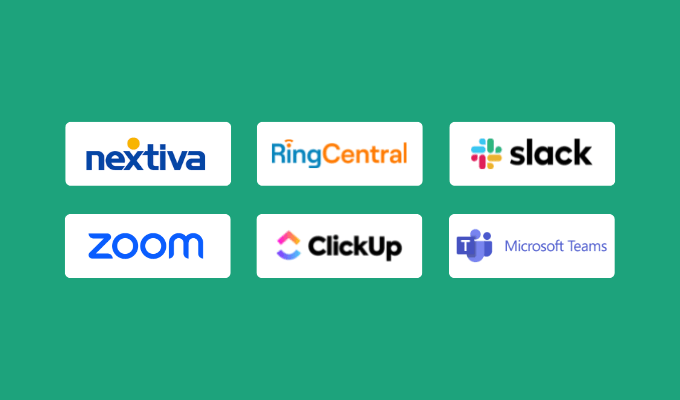
Match Your Scenario to the Right Business Communications Solution
Our research team identified the top reasons why organizations need business communication tools. If you see a scenario below that best fits your needs, you can jump straight to that section to quickly identify the top tools in that category. You’ll also learn more about what to look for while evaluating tools for that specific scenario.
- Your team is fully remote or hybrid
- You need to host lots of virtual meetings
- High-quality VoIP phone communication is your top priority
- Your team needs collaborative project boards
- Most of your communication is handled via team chat
Your team is fully remote or hybrid
Best Option: RingCentral
RingCentral is a hardware-free communication tool, making it an excellent option for remote and hybrid work environments. Your staff can access RingCentral from any device and have all of the communication tools they need at their fingertips—including phone, SMS, live chat, and video.
It’s easy to deploy and add new users as well. So if you’re hiring new remote employees, they can get set up at home without any technical assistance. Thanks to the RingCentral mobile app, your staff can even stay in contact when they’re on the go.
Another Great Choice: Slack
Slack makes it possible to eliminate lengthy email chains and keep your entire team on the same page. Even if people are working from home or operating in different time zones, this instant messaging program is designed to keep everyone connected. You can use Slack to create organization-wide channels, department threads, small group chats, and even one-to-one chats that support audio calls, video calls, and huddles.
If you have remote or hybrid employees applies to you, pay attention to:
- Mobility: The tool should seamlessly transition between home laptops, office desktops, and smartphones to accommodate any type of work environment.
- Simple Deployment: Remote workers won’t have dedicated IT staff on-site, so they should be able to install and use the tool without any technical assistance.
You need to host lots of virtual meetings
Best Option: Zoom
Zoom offers premium business plans that support virtual meetings with up to 1,000 attendees. Even the free plan lets you host 40-minute meetings with 100 attendees. This is perfect for organizations that constantly need to collaborate both internally and externally with presentations to stay on the same page.
The software has built-in collaboration tools for screen sharing and co-annotations, and supports up to 49 videos on the screen. You can use Zoom to record your meetings and transcribe them as well, making it easy to share with anyone who was unable to attend.
Another Great Choice: Microsoft Teams
Microsoft Teams lets you host unlimited group meetings with up to 300 participants. If you’re on a Microsoft 365 plan, you can enable live captions and meetings recordings with transcripts. Microsoft 365 Standard users get the added benefit of webinar hosting with up to 1,000 attendees.
If you’re a high-volume virtual meeting user, look for:
- Participant and Duration Limitations: You want to make sure the tool you’re using can handle the number of people attending your meetings and that your meetings won’t be cut short. Some free and entry-level tools might cap you at 40 minutes per meeting.
- Presentation Features: Screen sharing, hand raising, and live annotations are crucial for presenters during meetings—especially when you have dozens or hundreds of people attending.
- Recordings and Transcriptions: If people can’t attend a meeting, you can easily send them a recording. Transcriptions are also helpful for quickly jumping to a section without having to search for it in the recording.
High-quality VoIP phone communications is your top priority
Best Option: RingCentral
If most of your business communication is happening over the phone, RingCentral’s VoIP phone system has you covered. Your entire team will benefit from unlimited calling within the US and Canada, so you’ll never have to worry about minute restrictions.
As a cloud-based tool, your staff can access RingCentral’s phone system from anywhere without any on-premises hardware. With less than six minutes of annual downtime, the system is ultra-reliable as well. If you have global offices or need to connect with vendors, partners, suppliers, or customers in different regions, you can use RingCentral’s VoIP phone to reach 110+ countries.
Another Great Choice: Zoom
Zoom’s VoIP phone system is easy to use from the desktop or mobile app. It comes with powerful features like call transfers, call forwarding, call recording, and even Salesforce integrations for sales teams. You can get a Zoom VoIP plan on its own or get it included with a Business Plus subscription of Zoom One—which is the best value for a complete communication suite.
For VoIP phone systems, keep an eye on:
- Call Quality: Calls should be clear and crisp without any lagging or echoes.
- Uptime and Reliability: If the system goes down, your team won’t be able to make calls, and current calls could be dropped. So you should look for a solution with high uptime rates.
- Minute Restrictions: Some systems give you unlimited minutes with specific plans. Others give you minute restrictions or offer pay-as-you-go pricing.
Your team needs collaborative project boards
Best Option: ClickUp
ClickUp makes it easy to organize tasks and projects through visual project boards. Your team can use it to track progress, monitor responsibilities, and collaborate and tasks together. It also supports file sharing with unlimited storage, so you never have to worry about running out of space.
With Kanban boards, Gantt charts, sprint planning, and agile reporting, ClickUp supports a wide range of project management methodologies. The platform integrates with more than 1,000+ other tools, helping to streamline the way your team communicates with other systems your business is already using.
Another Great Choice: Zoom
Zoom has an excellent whiteboard feature that makes it easy for teams to collaborate and brainstorm from anywhere. The use cases for this feature are extremely versatile and can be applied to interactive meetings, idea generation, presentations, and so much more. The platform also supports secure file sharing and a powerful search function that makes it easy to find files quickly.
If you’re working on collaborative projects, pay attention to:
- Board View Type: There are lots of different ways that teams use project boards to collaborate. So you want to make sure the tool you’re considering can visualize your project in a way that your team is familiar with.
- File Sharing: Document sharing and collaborative editing is crucial for collaborative projects.
Most of your communication is handled via team chat
Best Option: Slack
Slack is the ultimate team messaging tool. It’s great for quick pings and questions between co-workers, but it also works for large group messaging.
You can organize your Slack business account into different channels. This makes it easy to segment users by role or department. For example, you can create separate channels for marketing and accounting. So your marketing team won’t see any department-wide messages sent to the accounting channel.
Another Great Choice: Microsoft Teams
Microsoft Teams is a feature-packed team chat solution. Beyond basic instant messaging, the platform also supports voice messages, rich text editing, and even translations for team members collaborating worldwide. Similar to an email, you can also use MS Teams to schedule an instant message delivery if you don’t want to disturb a team member in another time zone at night or on the weekends.
If team chat is your primary communication method, look for:
- User Segmentation: So you can organize your team by role or department.
- File Sharing: To quickly deliver documents via chat.
- User-Friendly Interface: So your team can easily find the person or group they want to connect with, even if you have hundreds or thousands of people in your organization.
Business Communication Tools Company Reviews
Our team has thoroughly researched dozens of business communication tools on the market before narrowing down our list to five that we can recommend with confidence. Each business communication tool reviewed below stands out from the crowd for a particular use case or scenario, which we’ve highlighted in the review.
Continue below to read our reviews of the best business communication tools, which will make it easy for you to find the best option for you.
Nextiva – Best VoIP phone system for most businesses
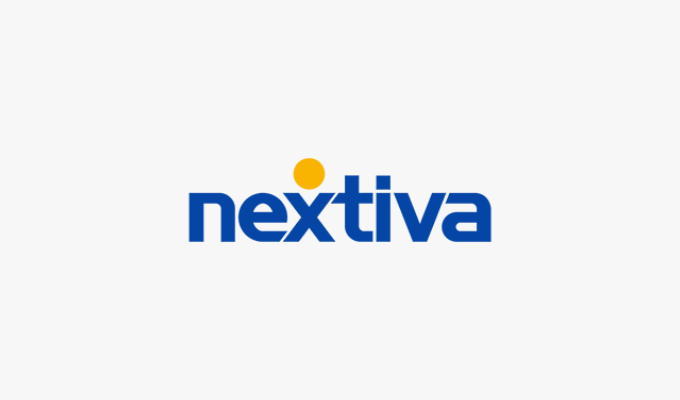
Nextiva is a great option for any organization seeking a modern business phone solution. It works well if you’re switching from a legacy landline and also accommodates new businesses that want to deploy a completely new phone system.
One of the best parts of using Nextiva for business communications is its mobility. This is ideal for businesses with remote, hybrid, and field-service teams. Users can make and receive calls directly from their smartphones using Nextiva’s iOS and Android mobile apps. Calls can also be handled from computers through the Nextiva desktop app.
As a VoIP phone system, Nextiva does much more than just allow for traditional calls. The platform also supports video calls, live chat, SMS texting, faxing, and more. It’s feature-packed with team collaboration tools as well.
It’s worth noting that Nextiva doesn’t have a free plan or trial. You can get a demo, but there’s no way to test it beyond that.
What Makes Nextiva Great
Nextiva shines above other business communication tools with its crystal-clear call quality and reliability. It boasts a 99.999% uptime rate and has excellent 24/7 support.

You’ll benefit from unlimited calling in the US and Canada, faxing, and nationwide texting—all from the same plan. The software is versatile enough for regular calls, but it also works well for conference calls and team collaboration. You can even extend its functionality with helpdesk tools and sales CRM features to manage calls and customers from a single source of truth.
Nextiva has insightful call analytics as well. This includes both historical and live call data and real-time call tracking. These features are great if you want to QA call quality, analyze business trends, or assess employee performance.
The VoIP phone plans start at $21.95 per user per month. Pricing varies based on your contract length and user count. Get a quote today.
Get more detail and see if Nextiva is right for your business from our in-depth Nextiva Review.
RingCentral – Best for unified business communications
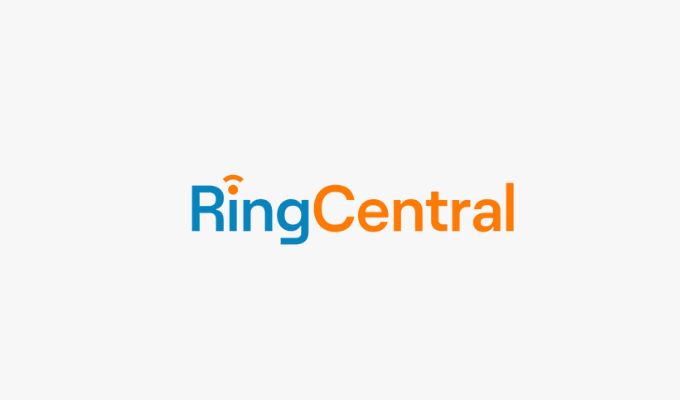
Business communications is a fairly broad term. It could apply to internal communications, external communications with customers, prospects, or vendors, team collaboration, and more. Fortunately, with RingCentral, you can get all of your business communications needs from a single provider.
RingCentral is an all-in-one platform for VoIP phone communications, video conferencing, team chat, SMS messaging, and more. You can even use it as an internet fax service, truly covering all of your business communications needs.
Whether you need a phone service for sales teams, live chat for internal messaging, or video conferencing for company-wide presentations, RingCentral has everything under one roof.
One drawback of RingCentral is its entry-level plan. You’re forced to upgrade if you have more than 20 users, so it’s only a viable option for small teams.
What Makes RingCentral Great
RingCentral shines above other business communications systems because it eliminates the need for you to use multiple tools for different solutions. From a single dashboard, your team has quick access to everything they could possibly need to communicate both internally and externally.
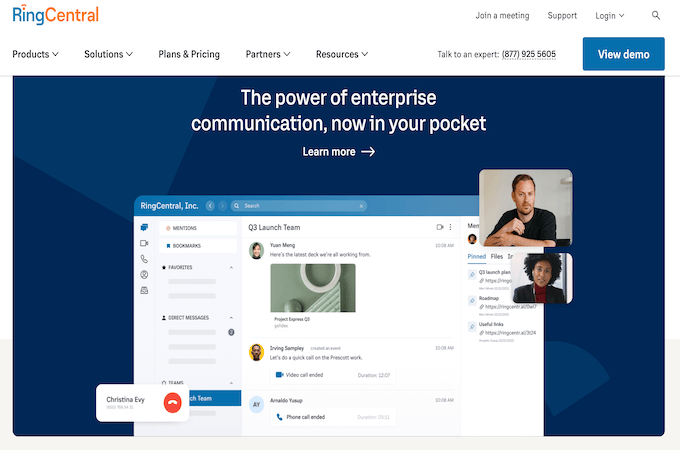
As a cloud-based solution, there are no hardware requirements or complex deployments. This makes it a great option for dispersed teams working hybrid or remotely. With the RingCentral mobile app for iOS and Android, everyone in your organization can stay connected on the go as well.
The platform supports unlimited calling in the US and Canada, unlimited storage, and integrates with your favorite third-party business apps. From document sharing to advanced analytics and reporting tools, RingCentral has it all.
Pricing is based on how many users you have, with plans starting at $19.99 per user per month. The Premium plan, starting at $34.99 per user per month, is the best value for businesses with more than 20 users. You can try it for free with a 15-day free trial, and check out our RingCentral review to learn more.
Slack – Best for internal team messaging
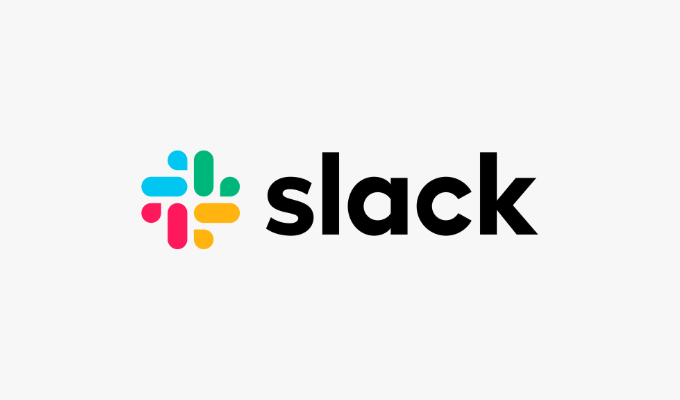
Instant messaging has become a popular way for modern teams to communicate. Whether your entire team is located in a single building or you have employees working remotely or hybrid in different locations, Slack is the best way to keep everyone on the same page.
Slack is just a simpler way to communicate than email. Teams can use it for one-off questions and messages or have full conversations via live chat—which isn’t an option when with email.
With Slack, every user can keep their team informed of their status as well. So you’ll know whether someone is in a meeting, out of the office, or simply doesn’t want to be disturbed. This is really helpful when you’re trying to connect with someone, as you’ll have some expectations on when you’re getting a reply.
While Slack does offer audio and video chat functions, it’s not ideal for large virtual meetings beyond a handful of people. It’s also not a replacement for a complete business phone system, so you can’t use it to cold call a prospect’s cell phone.
What Makes Slack Great
Slack’s way of segmenting users into groups and channels is an excellent way to stay organized—especially for large organizations. There are certain messages that you want everyone within a particular department or project group to see. But at the same time, you don’t want to overwhelm users who wouldn’t find the information relevant.
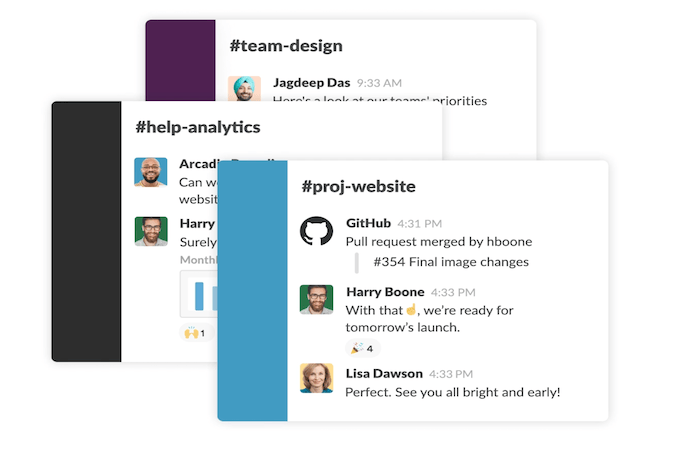
If you have sensitive or confidential information that needs to be kept a secret, Slack also gives you the option to create private channels for specific people.
More than 100,000+ organizations rely on Slack for workplace communication. So there’s a good chance your clients, vendors, or partners are using Slack as well. Slack has a feature that lets you connect with other businesses using Slack—simplifying communication for all parties involved.
Plans start at $7.25 per user per month, and you can try it for free to get started.
Zoom – Best for video conferencing

Unless you’ve been living under a rock for the past few years, you’ve probably heard of Zoom. While this tool originally gained popularity for keeping people connected in their personal lives, it’s quickly become one of the top business communication tools as well—specifically excelling in video conferencing.
Whether you want to start a one-to-one video call on-demand or schedule a virtual meeting for hundreds of attendees, Zoom has you covered. It’s a great option for company-wide meetings and even extends to sales pitch presentations. The options are extremely versatile.
One downside of Zoom is that the meeting quality is reliant on a strong internet connection. Otherwise, you may experience some lagging and other issues on the call.
What Makes Zoom Great
Zoom shines with its ability to accommodate meetings of all sizes. It supports video conferences with up to 1,000 attendees and 49 simultaneous video streams on the screen.
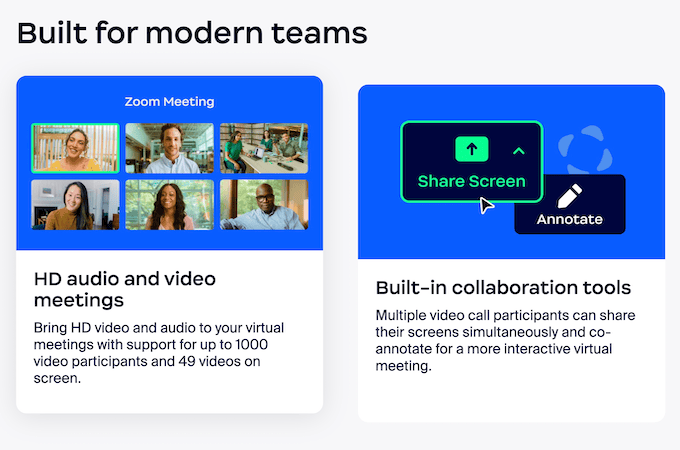
It’s also an excellent option to keep people interactive during a video call. There are features for hand raising, file sharing, polls, live reactions, and more. Zoom also has built-in collaboration tools and annotation features that take video presentations to the next level.
You can integrate Zoom with your calendar system to simplify scheduling and quickly access your meeting links. Users love Zoom’s ability to record and transcribe calls, as it’s easy to reference things later or share them with people who were unable to attend.
Beyond video calls, Zoom also has other communication tools for live chat, audio, and VoIP phone. So your team can seamlessly transition from an internal video conference to outbound or inbound calls from external sources—all from one system.
Plans start at $149 per user per year, and you can try it for free for 30 days. To learn more about Zoom’s plans and pricing, check our in-depth Zoom review.
ClickUp – Best for project management collaboration
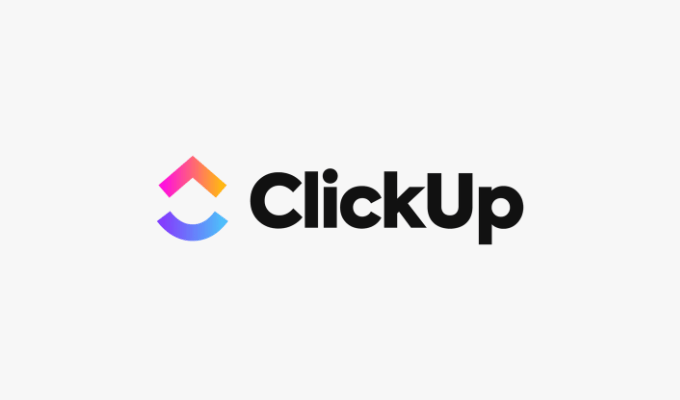
Business communication extends beyond phone, video, and live chat. There’s also the team collaboration aspect that must be taken into consideration, which is where ClickUp stands out above the crowd.
The problem with most modern business communication tools is that they’re not truly an all-in-one solution. You might be able to use it to chat with your team or hop on calls, but you still need to use a third-party solution to manage tasks and projects. Branded as “one app to replace them all,” ClickUp solves this problem.
ClickUp offers task management, document sharing, and project boards from a single source of truth. It’s worth noting that it doesn’t have audio or video conferencing capabilities. But that’s fine if your team only needs the live chat option.
What Makes ClickUp Great
ClickUp eliminates the need for you to use third-party project management software in addition to your communication software. It gives you everything from a single solution, so you’re not constantly bouncing back and forth between multiple platforms.
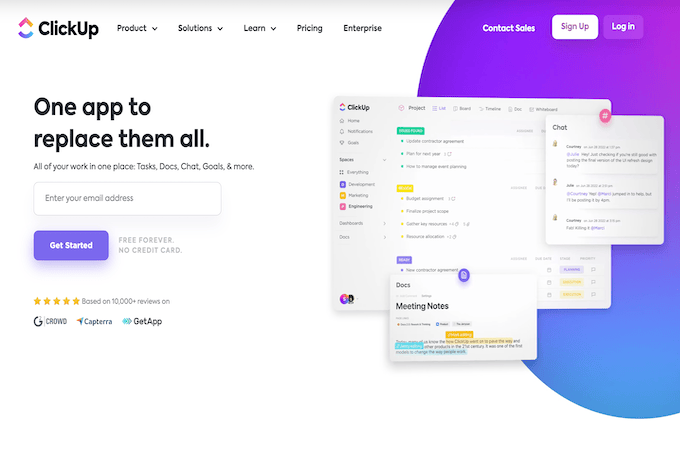
It’s one of the only project management tools on the market with built-in live chat. So if you’re working on a task and need to quickly reach out to someone to share an update or get your questions answered, you can do so from the same screen.
But you’re definitely not sacrificing project management features, either. You can view tasks as a list, Gantt chart, kanban board, and more. Plus, ClickUp supports sprint planning and agile reporting to ensure you’re getting detailed analytics about how your projects are progressing.
Plans start at just $5 per user per month, which is perfect for small teams. ClickUp also has a free forever plan. But the free plan is fairly basic and should only be treated as an extended free trial.
Microsoft Teams – Best for Larger Organizations Already Using a Microsoft Ecosystem
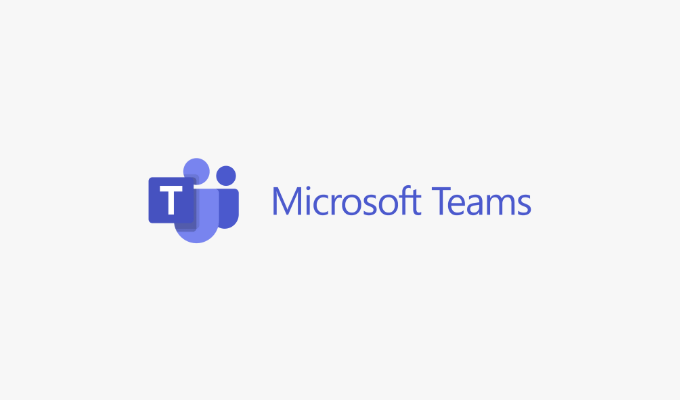
Managing business communications with just a dozen or so team members is fairly easy. But for enterprises with hundreds or thousands of employees, this gets a bit trickier. Fortunately, Microsoft Teams has you covered.
You can use Teams on its own as a standalone communication solution. But most organizations would benefit the most by using teams as part of a Microsoft 365 subscription. This gives you access to the best enterprise-grade features, like SSO, multi-factor authentication, advanced audits, and more.
If your organization is already using Microsoft tools like Azure Active Directory, Excel, Powerpoint, Word, OneDrive, or Outlook, this will be the best option for you.
However, Microsoft Teams doesn’t always play nice with products outside the Microsoft ecosystem, like Box, Drive, Google Docs, or Google Workspace.
What Makes Microsoft Teams Great
Microsoft Teams is built for large organizations out of the box. Even the entry-level MS Teams Essentials plan supports meetings with up to 300 participants.
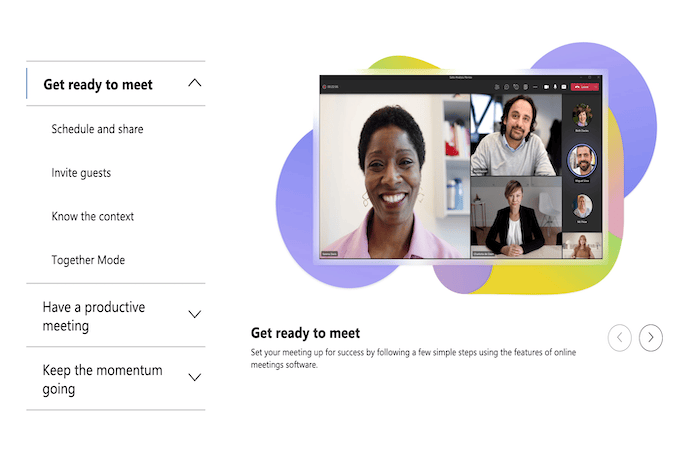
For such a powerful tool, Microsoft Teams is actually very easy to use. Your staff can easily start an audio or video call with another user or just use the team messaging feature for quick communication.
The software has some of the best built-in accessibility tools on the market. You’ll benefit from transcriptions and even live captioning, which can help people who have trouble hearing or have a different native language.
You can use it to set up private communication channels for collaboration and even manage access to files and shared documents. As a Microsoft product, it’s very easy to access and share Word documents, Powerpoint presentations, Excel sheets, and other MS files.
Microsoft Teams starts at $4 per user per month. But it’s better to get it included with your Microsoft 365 subscription, where you can get a suite of Microsoft tools for $12.50 per month. Our complete Microsoft Teams review has more information on plans, pricing, and features.
Quick Sprout Business Communication Tools Related Content
The topic of business communication has been covered extensively by our team here at Quick Sprout. Below you’ll find some related tutorials, company reviews, and other useful resources to help you get started and succeed with your business communication solutions.
Business Communication Tools Guides and How-Tos
- Fixed VoIP: The Complete Guide
- Non-Fixed VoIP: The Complete Guide
- How Does Google Voice Work?
- How to Integrate Project Management Into Slack
- How to Organize Slack Channels
Business Communication Tools Company Reviews
Business Communication Tools Comparisons
- Contact Center vs. Call Center
- Zoom vs. Adobe Connect
- Nextiva vs. RingCentral
- Webex vs. Microsoft Teams
- VoIP vs. Landline
Business Communication Tools Related Top Lists
- Best Office Phone Systems
- Best Business Phone Services
- Best Collaboration Software
- Best Business Messaging Apps
- Best Virtual Conference Platforms
- Best Video Conferencing Services
- Best VoIP Providers
- Best Cloud-Based Business Phone Systems
- Best Free and Paid Conference Call Services
- Best Live Chat Software
- Best Call Center Software
- Best Multi-Line Phone Systems For Small Business
The Top Business Communication Tools in Summary
The best business communication tools make it easy for organizations to communicate from anywhere. They include features for team messaging, VoIP audio, video conferencing, collaboration, and more.
Nextiva is our top recommendation, as it checks all the boxes businesses need in this category. But if you have a unique scenario, you can use the reviews and recommended use cases in this guide to find the best business communication tool for you.
